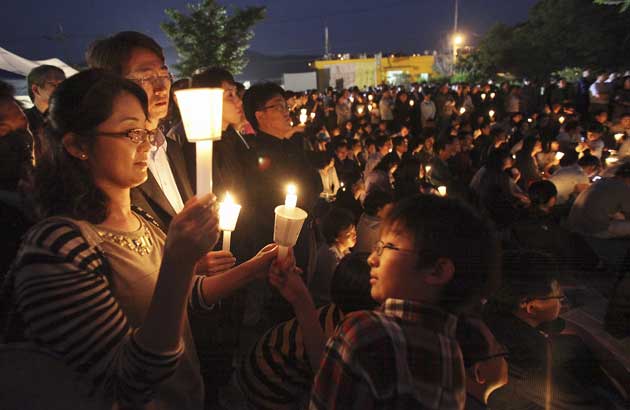Ex-South Korean leader jumps to his death from clifftop
Roh Moo-hyun, 62, leaves 'extraordinary' suicide note after police question him over bribery scandal

The former South Korean president Roh Moo-hyun, who was recently questioned about allegations he took $6m in bribes from a businessman, yesterday jumped to his death while hiking in the mountains behind his rural home. He was 62.
Mr Roh, who had gone walking with a security guard, threw himself off a 100ft-high cliff called Owl's Rock at about 6.40am, leaving behind an extraordinary suicide note. He wrote: "Too many people are suffering because of me. What's left for me for the rest of my life is just to be a burden to others. Don't be saddened too much. Aren't life and death all a fragment of nature? Don't feel sorry. Don't blame anybody. It's destiny."
The suicide stunned the nation and South Koreans huddled around television screens at Seoul's main train station and elsewhere. "I was utterly shocked," said Chun Soon-im, 63, of Seoul. "They say 'hate the sin but not the sinner,' and that's how I feel. The investigation must continue and we must get to the truth, but I cannot help feeling sorry for the man and those left behind."
A self-taught lawyer who lifted himself out of poverty to reach the nation's highest office, Mr Roh prided himself on his clean record in a country with a long history of corruption. He served as President from 2003 to 2008. But he and his family have been ensnared in recent weeks in a burgeoning bribery scandal. Last month, state prosecutors questioned Mr Roh for 13 hours about allegations that he accepted more than $6m in bribes from a South Korean businessman while in office – accusations that deeply shamed him. "I have no face to show to the people. I am sorry for disappointing you," an emotional Mr Roh said late last month before speaking to prosecutors.
He denied the allegations against him during questioning, prosecution spokesman Cho Eun-sok said. Mr Roh had acknowledged that a local shoe manufacturer, Park Yeon-cha, gave his wife $1m, but suggested it was not a bribe. He also said he was aware Mr Park gave $5m to another relative but said he thought it was an investment. Prosecutors suspect the $6m was eventually conveyed to Mr Roh. Several of his former aides and associates have also been investigated on suspicion of taking money from Mr Park, who was charged in December with bribery and tax evasion. Mr Roh's elder brother was sentenced last week to four years in prison in another bribery scandal.
Mr Roh, thought to be in good health, hinted in the suicide note that stress had taken its toll, saying it was hard for him to even read and write. He asked to be cremated and a small gravestone erected near his home.
Mr Roh's death was a tragic end for the son of farmers who never attended college but managed to pass the country's bar exam in 1975 by teaching himself law. He built his reputation defending students accused of sedition under previous military-backed administrations, and once was arrested and had his law licence suspended for supporting an outlawed labour protest. His political career took off with his election as a liberal lawmaker to the National Assembly in 1988. His ascension to the presidency came in a surprise 2002 election win on a campaign pledge not to "kowtow" to the United States, a pledge that resonated with young voters.
In office, he maintained his predecessor Kim Dae-jung's "sunshine policy" of offering North Korea aid as way to facilitate reconciliation, and held a summit in Pyongyang with the North Korean leader Kim Jong Il in 2007, the second such meeting between leaders of the two countries that technically remain at war. Though criticised as standoffish and confrontational by some, he was praised by others as a candid leader who cared for the underprivileged and fought against corruption.
But in 2004, Mr Roh urged voters to support candidates from his Uri Party – a violation of political neutrality laws. He became the first South Korean president impeached over the violation, but was reinstated after a court ruled against the impeachment.
"He shocked us twice: first, by betraying our trust in him as the keeper of justice when it was revealed that he'd received the illegitimate money; now, in showing that he was not even responsible enough to face the consequences of his action," said Kim Hye-jung, 35, of Seoul. "As a supporter of the values he stood for, I feel greatly let down."
Mr Roh is survived by his wife, Kwon Yang-sook, son Ron Gun-ho and daughter Roh Jeong-yeon.
Subscribe to Independent Premium to bookmark this article
Want to bookmark your favourite articles and stories to read or reference later? Start your Independent Premium subscription today.

Join our commenting forum
Join thought-provoking conversations, follow other Independent readers and see their replies